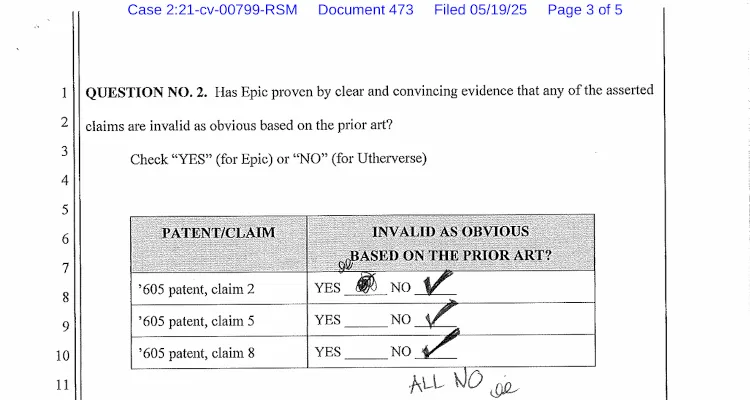
The jury verdict in favor of Epic Games, which has prevailed in a marathon patent infringement lawsuit centering on the technology behind Fortnite concerts from Travis Scott and Ariana Grande. Photo Credit: Digital Music News
Four years and one week-long trial later, Epic Games has triumphed in a patent infringement suit involving Fortnite concerts from Travis Scott, Ariana Grande, and others.
The jury just recently sided with Epic, which a company called Utherverse Gaming sued back in June 2021. Letting this initial complaint take the wheel for a moment – and keeping the focus on brass-tacks details – the plaintiff said it’d assumed ownership in 2020 over several patents.
As laid out by the filing party, three of the patents concerned “multi-instance, multi-user animation platforms,” with another describing tech purportedly allowing “for massively populated virtual worlds in which participants can share the same experience without overcrowding.”
Citing, among other things, Scott’s mentioned 2020 Fortnite show, the plaintiff maintained Epic had “utilized the claimed inventions of the Asserted Patents to host repeatable, large-scale events for multitudes of participants.”
That refers specifically to “the software that when executed on a server enables many Fortnite participants to experience the same virtual worlds for virtual social events and concerts,” according to the document.
Unsurprisingly, in light of the newly concluded trial, Epic refuted the allegations – including by firing off counterclaims challenging the patents’ validity and more.
When all was said and done, the trial and the jury’s assessment boiled down to whether Epic had infringed one patent, “Method, System and Apparatus of Recording and Playing Back an Experience in a Virtual Worlds System,” in its Grande and Scott concerts.
In the jury’s eyes, neither of those digital happenings constituted infringement of the claims within the central patent, the verdict form shows.
But the jury also found – perhaps, given the presence of some clarifying markings, after a bit of debate – that Epic hadn’t proven the patent claims to be “invalid as obvious based on the prior art.”

Close but no cigar: Another page from the jury’s verdict form. Photo Credit: Digital Music News
(On the debate front, it evidently wasn’t a good sign for the plaintiff when the already-deliberating jury asked the presiding judge if unanimous verdicts were required. “The jury must be unanimous when it answers any individual question on the verdict form,” the court reiterated in response.)
Lastly, on the same form, the jury determined Epic had proven one of the patent’s relevant claims “involved only technology that a person of ordinary skill in the art would consider to be well-understood, routine, and conventional as of” 2014.
With that, the jury necessarily left blank the verdict form’s damages page, including a section for a percentage-royalty obligation.
Gaming, Intellectual Property Protection, Music Law, 2:21-cv-00799
This post was originally authored and published by Dylan Smith Digital Music News via RSS Feed. Join today to get your news feed on Nationwide Report®.



























